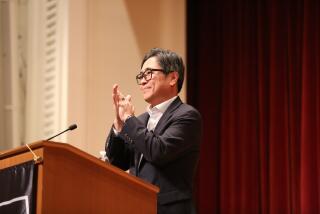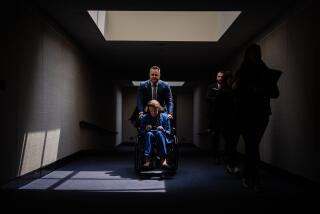MacArthur Foundation names 2014 fellows
From poets and playwrights to psychologists and computer scientists, the MacArthur Foundation on Tuesday night unveiled its list of 2014 fellows.
Among the 21 fellows is Jennifer Eberhardt, 49, a social psychologist from Stanford University. Eberhardt is heralded by the foundation for her work concerning “racial bias in modern policing and criminal sentencing.”
Each year MacArthur awards grants to individuals from different disciplines to build on their work and expand ideas and approaches. The $625,000 grants are paid quarterly over five years with no strings attached. Below is snapshot of the 2014 class of fellows with descriptions of their work including snippets from their fellowship biographies.
Arts
Joshua Oppenheimer, 39, Copenhagen
Documentary filmmaker
The director of the acclaimed Indonesian genocide documentary “The Act of Killing” is considered an innovator in the documentary form. The U.S.-born, Denmark-based filmmaker is best known for his 10-year project that examined the purge of an estimated 500,000 suspected communists by the Pancasila Youth paramilitary movement in 1965-66 Indonesia. Rather than use conventional methods such as talking heads or extensive archival footage, Oppenheimer had the people who conducted the purges reenact them, as the filmmaker followed their activities in a chillingly fly-on-the-wall manner.
Samuel D. Hunter, 33, New York
Playwright
Originally from the West, the playwright has been casting his eye on the spiritual malaise of the nation. His plays, frequently set in Idaho against the backdrop of majestic mountain ranges and in towns dominated by fast-food restaurants, chain stores and churches, grapple with related subjects that were fundamental to Greek tragedy: the limitation of humanity’s vision, the place of religion in society and the desperate longing for relief from the alienation of modern life.
Alison Bechdel, 54, Bolton, Vt.
Cartoonist and graphic memoirist
The innovative comic artist known for the graphic memoirs “Fun Home: A Family Tragicomic” and “Are You My Mother” is at an artist residency in Italy and initially didn’t pick up the phone when the MacArthur Foundation called. When the phone rang again, she figured it must be important. “It was crazy,” she said. “It was a little garbled, then I heard the person on the other end say the words MacArthur Foundation, and the world started spinning.”
Terrance Hayes, 42, Pittsburgh
Poet
The National Book Award-winning poet, like other fellows, was given the news a few days ago and sworn to secrecy — a challenge for Hayes. “I’m the one that talks,” Hayes said from his home in Pittsburgh. “I’ve avoided my mother, people I’d be inclined to tell.” He said he planned to continue teaching at the University of Pittsburgh, where he is an English professor. “I value teaching. It’s one of the places I get inspiration, engagement.”
Steve Coleman, 57, Allentown, Pa.
Jazz composer and saxophonist
The MacArthur Foundation praised the saxophonist, composer and educator for “infusing iconic spontaneous music idioms with the melodic, rhythmic and structural components of an eclectic range of musical traditions to create a distinctive new sound.” Coleman is also known as the driving force behind M-Base, a loose musical collective that began in the ‘80s as well as an evolving school of creative thought. An acronym for Macro-Basic Array of Structured Extemporizations, M-Base emphasizes artistic expression of personal experiences without structural or stylistic limitations, a philosophy that continues to be heard across the spectrum of contemporary jazz. Among the many artists influenced by Coleman and M-Base are Ambrose Akimusire, Cassandra Wilson, Greg Osby, Dave Holland, Ravi Coltrane, Geri Allen and 2013 MacArthur Fellow Vijay Iyer.
Khaled Mattawa, 50, Ann Arbor, Mich.
Translator and poet
The poet, translator and University of Michigan professor won admiration from the MacArthur Foundation for “rendering the beauty and meaning of contemporary Arab poetry to an English reader and highlighting the invaluable role of literary translation in bridging cultural divides.”
Rick Lowe, 53, Houston
Public artist
Lowe is the founder of Project Row Houses, which is a nonprofit that revitalizes houses in Houston’s northern Third Ward. The MacArthur Foundation lauds Lowe for his work as a “a vital anchor for what had been a fast-eroding neighborhood, providing arts education programs for youth, exhibition spaces and studio residencies for emerging and established artists.”
Law and social sciences
John Henneberger, 59, Austin, Texas
Housing advocate
Henneberger touts on his Twitter account being an advocate for “affordable, fair housing in diverse, healthy communities.” The MacArthur Foundation lauds his work in transforming the way “Texas and its local governments address affordable housing, community development, and fair housing and inspired new rule-making at the U.S. Department of Housing and Urban Development.”
Jennifer Eberhardt, 49, Stanford, Calif.
Social psychologist
Eberhardt was cited for her efforts to examine how subtle, ingrained racial biases influence not just how we view people but the objects of our daily world — and how those perceptions skew institutions such as the criminal justice system. She has transferred that work from laboratories filled with brain-scanning machines to police precincts, where she has advised cops about the ways their own minds can lead them onto perilous ground.
Mary L. Bonauto, 53, Boston
Civil rights lawyer
Bonauto is the Civil Rights Project director at Gay & Lesbian Advocates & Defenders, where she has worked since 1990. Her work focuses on the effect of litigation for the lesbian, gay, bisexual and transgender communities. In her MacArthur biography she is praised for her “powerful arguments and long-term legal strategies” that have led to historic reforms.
Sarah Deer, 41, St. Paul, Minn.
Legal scholar and advocate
Deer is a professor of law at the William Mitchell College of Law, where she focuses on violent crimes on Indian reservations. She has written books on the matter, and the MacArthur Foundation says her work has leveraged a deeper “understanding of tribal and federal law to develop policies and legislation that empower tribal nations to protect Native American women from the pervasive and intractable problem of sexual and domestic violence.”
Ai-jen Poo, 40, New York
Labor organizer
Poo is director of the National Domestic Workers Alliance and has organized immigrant women workers since 1996. The MacArthur Foundation notes her “deep understanding of the complex tangle of human relations around domestic work with keen strategic skills ... has created a vibrant, worker-led labor movement.”
Tara Zahra, 38, Chicago
Historian of modern Europe
Zahara is a professor at the University of Chicago and is deeply engaged in international history and human rights. She’s working on a book about the history of emigration from East Central Europe to Western Europe and the United States. The MacArthur Foundation calls her a “historian who is challenging the way we view the development of the concepts of nation, family and ethnicity.”
Jonathan Rapping, 48, Atlanta
Criminal lawyer
Rapping is president and founder of Gideon’s Promise, an organization servicing public defenders. In the wake of Hurricane Katrina in New Orleans he worked extensively to rebuild the public defender system in the city. The MacArthur Foundation calls him a “advocate addressing failures of the U.S. criminal justice system to provide client-centered representation for indigent Americans.”
Sciences
Danielle Bassett, 32, Philadelphia
Physicist
In her work, Bassett uses various mathematical approaches to analyze how different parts of the human brain work. The work she and her colleagues have done at the University of Pennsylvania has pinpointed various parts of the brain that can be used to trigger different behavior.
Tami Bond, 50, Urbana, Ill.
Environmental engineer
Bond has studied the global effects of black carbon emissions on humans and the environment. She and her colleagues at the University of Illinois at Urbana-Champaign have used global climate models and analyzed how black carbon, which is emitted anytime something is burned, affects the environment.
Craig Gentry, 41, Yorktown Heights, N.Y.
Computer scientist
Gentry is an expert in cryptography and his work has led to breakthroughs in creating “computing environments more secure and compatible with data privacy for individuals,” according to his fellowship biography.
Mark Hersam, 39, Evanston, Ill.
Materials scientist
A professor at Northwestern University, Hersam investigates the chemical and biological properties of nanomaterials, according to his fellowship biography.
Pamela O. Long, 71, Washington, D.C.
Historian of science and technology
Long is the author of the 2001 “Openness, Secrecy, Authorship: Technical Arts and the Culture of Knowledge from Antiquity to the Renaissance.” The book has won numerous awards, including the Morris D. Forkosch Prize, for “its analysis of the co-evolution of artisans as writers and technological openness as an ideal in scientific inquiry,” according to her fellowship biography.
Jacob Lurie, 36, Cambridge, Mass.
Mathematician
Lurie, who is a professor at Harvard University, has focused some of his work on derived algebraic geometry. He has developed new theorems in the subject area and has composed detailed papers that examine topological aspects of algebraic geometry.
Yitang Zhang, 59, Durham, N.H.
Mathematician
Zhang is renowned for his work in analytic number theory. Zhang’s MacArthur fellowship biography touts his work in dealing with prime numbers.
More to Read
The biggest entertainment stories
Get our big stories about Hollywood, film, television, music, arts, culture and more right in your inbox as soon as they publish.
You may occasionally receive promotional content from the Los Angeles Times.






